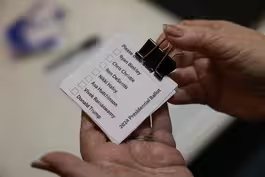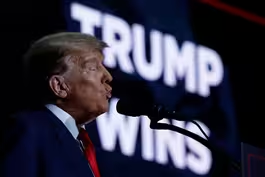
Insulin prices capped for some, cost still high for millions
Clip: 1/16/2024 | 8m 25sVideo has Closed Captions
New law caps insulin prices for some with diabetes, but cost remains high for millions
Diabetics will now see a break in their out-of-pocket costs for insulin. Sanofi, one of the leading manufacturers of the hormone, joined two other major pharmaceutical companies in capping their insulin copays at $35. This comes after years of pressure by President Biden, lawmakers and activists for companies to lower their list prices. White House Correspondent Laura Barrón-López reports.
Problems playing video? | Closed Captioning Feedback
Problems playing video? | Closed Captioning Feedback
Major corporate funding for the PBS News Hour is provided by BDO, BNSF, Consumer Cellular, American Cruise Lines, and Raymond James. Funding for the PBS NewsHour Weekend is provided by...

Insulin prices capped for some, cost still high for millions
Clip: 1/16/2024 | 8m 25sVideo has Closed Captions
Diabetics will now see a break in their out-of-pocket costs for insulin. Sanofi, one of the leading manufacturers of the hormone, joined two other major pharmaceutical companies in capping their insulin copays at $35. This comes after years of pressure by President Biden, lawmakers and activists for companies to lower their list prices. White House Correspondent Laura Barrón-López reports.
Problems playing video? | Closed Captioning Feedback
How to Watch PBS News Hour
PBS News Hour is available to stream on pbs.org and the free PBS App, available on iPhone, Apple TV, Android TV, Android smartphones, Amazon Fire TV, Amazon Fire Tablet, Roku, Samsung Smart TV, and Vizio.
Providing Support for PBS.org
Learn Moreabout PBS online sponsorshipbreak in their out-of-pocket costs for insulin.
This month, Sanofi, one of the# leading manufacturers of the hormon joined two other major pharmaceutical companies in## capping their insulin co-pays at $35.# This comes after years of pr President Biden, lawmakers and activists# for companies to lower their list prices.
White House correspondent Laura Barron-Lopez has# been covering all this, and she joins me here now.
Good to see you, Laura.
LAURA AMNA last year's insulin price caps for# Medicare recipients that took effect.
Tell us about the impact of# both of these things together.
LAURA BARRON-LOPEZ: So, what took effect this# mo Lilly and Novo Nordisk to implement this cap on# insulin co-pays at $35 that took effect January Now, that comes, as you noted, Amna,# after the Medicare cap on insulin cost## at $35 monthly for people.
And that comes# after President Biden also was pressuring## these companies to do this, and after the# provisions of the Inflation Reduction Act## that he passed with those Medicare# insulin caps took effect last year.
Now, just to add some context about the full# impact of this, I want to run through a few## of the numbers about insulin in the United# States.
So, in the U.S., around 8.4 million## diabetics need to inject insulin to survive,# according to the American Diabetes Association.
The three major manufacturers we're talking# about, Sanofi, Novo Nordisk, and Eli Lilly,## who cap their co-pays at $35, make up more# than 90 percent of the insulin market.
And the## Medicare provisions in the Inflation Reduction# Act mean that now about 1.7 million Medicare## beneficiaries stand to benefit from that# $35 monthly co-pay cap on their insulin.
So that shows the significance# of what's been happening.
AMNA NAWAZ: Millions of people,# right, who have to worry about## this.
Are there still people who are# still le LAURA BARRON-LOPEZ: So this could impact a lot# of people, but the key difference with what manufacturers did between the Medicare provision# is that the Medicare provi That means that someone goes to a pharmacy,# they're able to benefit from that $35## monthly co-pay, whereas people who under# private insurance or who are not insured,## who don't have insurance who may benefit from# what the manufacturers did, it's not automatic.## They have to register for programs.
And it can# become pretty complicated for them very quickly.
And I spoke to Shaina Kasper, a policy director# at T1International.
They advocate for insulin## access.
And she said that she's fearful that# manufacturers could simply decide at any point## we're not going to provide this reduction in# insulin cost, and that essentially what needs## to happen is a federal mandate, so that way# these manufacturers for uninsured patients,## for people who have private insurance can# benefit from a cap on their insulin cost.
AMNA NAWAZ: So, Laura, you mentioned that# insulin cap for Medicare beneficiaries as## part of President Biden's Inflation Reduction Act.
Are there other health care measures that## are taking effect this year or# next LAURA BARRON-LOPEZ: We have seen already two big# on and the free vaccines.
But there's a lot# more to come for Medicare beneficiaries.
So I want to run through the timeline.
Basically,# 60 million people are covered under Medicare.
And## so this month, in January of 2024, prescription# costs of certain drugs for Medicare recipients## is going to be capped at $3,300 annually.# And that's especially helpful for people## with expensive medication for chronic# conditions like arthritis and cancer.
Then, in September of this year, the new# list prices of 10 major drugs are going## to be made public.
That was made possible# by the Inflation Reduction Act's provision## allowing Medicare to negotiate# drug prices with manufacturers.
And then, by 2025, that annual cap on# prescription costs will drop to $2,000.
And,## in 2026, those new drug list prices# that Medicare was allowed to negotiate## will take effect, so people will start to feel it.
Now I spoke to Juliette Cubanski, the# deputy director of Med and this is how she described the significance# of those coming negotiated drug prices.
JULIETTE CUBANSKI, KFF: This has been for years a# concern for policymakers, particularly Democrats,## who thought Medicare should have the ability# to negotiate drug prices with manufacturers.## But prior to the Inflation Reduction# Act, it was actually prohibited by law.
So giving Medicare the ability to negotiate drug# prices is meaningful, because there are 60 million## people covered by Medicare, and that's a lot of# leverage that the federal government now has.
LAURA BARRON-LOPEZ: So, when Juliette says, for# years, that Democrats have been trying to pass## a law that allows Medicare to negotiate drug# prices, she's talking about going back decades## to the George W. Bush administration,# when this was trying to get passed.
And for those who are concerned about the deficit,# she says this has an i JULIETTE CUBANSKI: So the Congressional Budget# Office estimated that Medicare would save around## $300 billion over 10 years as a result of# changes in the Inflation Reduction Act,## and much of that is due to the new negotiation# program that Medicare is currently implementing.
So, Medicare will save money because# the cost of drugs will be lower.
LAURA BARRON-LOPEZ: So what that means,# Amna, is that Medicare costs for American## taxpayers will also be lower, and it will# as well be lower for Med AMNA NAWAZ: So, you have been digging into## this and reporting all Do most people understand all of these# changes?
A is President Biden getting credit for this?
LAURA BARRON-LOPEZ: So the# short answer, Amna, is that, no, most people don't understand# An d part of that may be because the Inflation# Reduction Act was this big signature la the president passed that includes also climate# change provisions and a number of other eleme that it appears, some Democrats say, is# hard for the average voter to understand.
But I spoke to Cornell Belcher,# a veteran Democratic pollster,## who said that, even more than a year after# the Inflation voters still don't quite know what's in it.
CORNELL BELCHER, Former Obama Campaign Pollster:# The Bi to tell, from everything from historical# infrastructure legislation, to historical# negotiations with pharmaceutical companies.
But, again, the challenge is, and we're# seeing that in -- with the voters, is,## so many of them don't know, and# they're not connecting the dots.
LAURA BARRON-LOPEZ: Juliette# Cubanski echoed that, Amna.
And so this is something that the Biden# campaign is go AMNA NAWAZ: Well, do we plan to hear# more from them on it?
I mean, so far,## the opening reelection campaign# message has democracy.
Will these issues be# a bigger part of t LAURA BARRON-LOPEZ: It is going to have to be a# critical part of their mes if the president is going to close that gap# in voters' perceptions around the So being able to lower health care costs# in people's pocketbooks is going to be a## part of that economic message.
And they# have spent tens of millions of dollars## on TV ads and digital ads, some of which# highlight the reduction in insulin caps,## some of which highlight the ability# for Medicare to negotiate drug prices.
But, still, Cornell said that they're going to## have to do a lot more than# just con CORNELL BELCHER: So you have got to flood the box## in a way that not even we had# to do I think he's got to -- the campaign# has got to lean into social media## spaces harder and in a new way than I# think we have ever had to in the past.
LAURA BARRON-LOPEZ: Ultimately, Amna, a lot of# the Democratic lawmakers that I spoke to said## that they want to see Biden make this message more# in key battleground states as ea The key difference, they said, between# 2016 and Hillary Clinton's campaign## and this election cycle and Joe Biden's# campaign is that Democrats in battleground## states say that Biden's campaign# is actually heeding their warnings.
AMNA NAWAZ: All right, that is our White# House correspondent, Laura Barron-Lopez.
Laura, thank you so much.
LAURA BARRON-LOPEZ
Breaking down the delegates and path to the GOP nomination
Video has Closed Captions
Clip: 1/16/2024 | 4m 32s | Breaking down the delegates and path to the Republican nomination (4m 32s)
Israeli officials disagree over how Hamas war should end
Video has Closed Captions
Clip: 1/16/2024 | 6m 35s | Israeli officials disagree in public over how war with Hamas should end (6m 35s)
Lebanon, Iraq attacks raises concerns about war escalating
Video has Closed Captions
Clip: 1/16/2024 | 3m 44s | World leaders concerned about Mideast war escalating after attacks in Lebanon and Iraq (3m 44s)
Republican strategist on Trump's grip on GOP after Iowa win
Video has Closed Captions
Clip: 1/16/2024 | 6m 31s | Republican strategist discusses Trump's grip on GOP after Iowa win (6m 31s)
Student network helps address mental health needs in schools
Video has Closed Captions
Clip: 1/16/2024 | 4m 58s | Student-led network helps address shortage of mental health professionals in schools (4m 58s)
'The Rebels' explores populism in the Democratic Party
Video has Closed Captions
Clip: 1/16/2024 | 6m 15s | New book 'The Rebels' explores how populists have transformed the Democratic Party (6m 15s)
Trump back in court for damages phase of defamation case
Video has Closed Captions
Clip: 1/16/2024 | 5m 26s | Trump back in court for damages phase of E. Jean Carroll defamation case (5m 26s)
Providing Support for PBS.org
Learn Moreabout PBS online sponsorship
- News and Public Affairs

FRONTLINE is investigative journalism that questions, explains and changes our world.

- News and Public Affairs

Amanpour and Company features conversations with leaders and decision makers.












Support for PBS provided by:
Major corporate funding for the PBS News Hour is provided by BDO, BNSF, Consumer Cellular, American Cruise Lines, and Raymond James. Funding for the PBS NewsHour Weekend is provided by...






